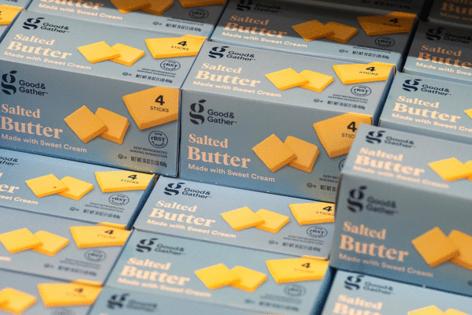Target, other retailers slash prices on milk, eggs and butter as shoppers tighten budgets
Published in Business News
Target said Tuesday that it will cut prices on 3,000 food, beverage and household essentials, joining retailers across the nation lowering prices on milk, eggs and butter ahead of the holiday season.
Cub Foods has reduced prices by about 40% on more than 30 grocery items, including bread and rotisserie chicken.
The moves come as millions of Americans await November federal Supplemental Nutrition Assistance Program (SNAP) benefits and others remain cautious about higher costs lingering since the pandemic.
Target is aiming to hold onto price-conscious shoppers as Walmart and others capture a larger share of higher-income consumers.
“I’m proud of the way our team moved quickly to lower prices on thousands of items our guests need most,” Lisa Roath, Target’s chief merchandising officer of food, essentials and beauty, said in a news release. “It’s important work that will make a difference for families managing tight household budgets during the holidays.”
The retailer also announced a $500,000 donation to Feeding America as “food banks nationwide brace for increased demand this holiday season,” the release said.
About 440,000 Minnesotans who receive SNAP benefits — and millions more nationwide — have been in limbo since the federal government shutdown began in early October. The shutdown, which has stalled funding for several key social programs, has left state agencies, food banks and recipients scrambling to interpret conflicting court rulings.
After a court order last week, the U.S. Department of Agriculture — which administers SNAP — said Minnesota could distribute November benefits using contingency funds, though payments would be cut by about half. A later ruling on Friday reversed that decision, allowing the state to pay recipients in full.
Minnesota began releasing full benefits over the weekend, but the USDA later instructed the state to roll back any payments. State officials said they were unable to do so.
The shutdown could end this week, allowing funds to be disbursed in the coming months. The deal in the U.S. Senate would fund SNAP benefits until September 2026 and back pay for furloughed federal workers.
The National Grocers Association (NGA) urged Congress to reopen the government, warning that grocers plan staffing and inventory around SNAP benefit cycles. When benefits are restored, the surge in demand could strain supply chains, according to the NGA.
“The retailer will likely see lower margins on the essentials,” said Akshay Rao, professor of marketing at the University of Minnesota’s Carlson School. “But whether it is an acknowledgment that the retail price was too high depends on the wholesale price they paid for it.”
Those lowering prices may have negotiated better deals with their suppliers by arguing they need to cut retail prices due to heightened price sensitivity among consumers, Rao said. Drawing those shoppers into stores could also lead to purchases of higher-margin items, offsetting losses on essentials.
Across Minnesota, SNAP recipients spend $70 million a month at grocery stores from Coborn’s and Cub to Aldi and Target.
A Target spokesman said Tuesday that the retailer’s price cuts are not in response to the shutdown or the SNAP program. Stillwater-based Cub did not immediately respond to requests for comment Tuesday morning.
Many chains are also reviving last year’s holiday promotions to attract deal-seeking shoppers. Walmart and the nation’s largest grocer, Kroger, are touting lower prices for Thanksgiving meals.
Target’s Thanksgiving meal for four costs $20, though some items have been swapped for private-label alternatives. Walmart’s advertised offering, priced under $40, now includes nine private-label items out of 15, compared with nine out of 21 last year. Aldi subbed Butterball turkeys for Jennie-O, cutting the cost by $7. And Cub’s spread comes in at $30.
Private labels have grown in popularity as shoppers look for more value. In Minneapolis, 64% of consumers said they would switch brands if their preferred one was too expensive, according to Deloitte’s Minneapolis holiday spending survey.
“We’re the home of Target, (and) mass merchants typically drive more value,” said Matt Marsh, Minneapolis managing partner at Deloitte. “Both nationally and in Minnesota, the search for value is a big driver of behavior. That’s across all cohorts.”
President Donald Trump recently said the economy is in a “golden age,” pointing to the cost of Walmart’s Thanksgiving meal bundle as an example.
“Grocery prices are way down, and Walmart just announced that the cost of their standard Thanksgiving meal — this is the greatest, their greatest,” Trump said in a speech to the American Business Forum on Wednesday.
Still, many Americans say they’re struggling to afford groceries compared with a year ago. A recent Harris Poll conducted with Axios found that most Democrats, independents and the general public said it’s harder to pay for groceries now, while only 34% of Republicans agreed.
©2025 The Minnesota Star Tribune. Visit at startribune.com. Distributed by Tribune Content Agency, LLC.












Comments